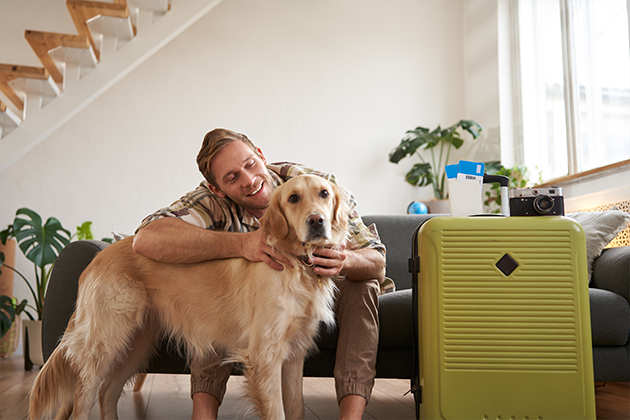Many hotel managers struggle with how to serve guests who have service dogs. Under the Americans with Disabilities Act, hotels must allow service animals in all guest areas and cannot charge extra fees for them. This guide provides clear steps on ADA compliance, handling requests, and avoiding legal violations.
Understanding Service Dogs in Hotels
Definition of a Service Dog
A service dog is a canine trained to help people with disabilities. The ADA defines a service animal as a dog that performs tasks related to the person’s disability. These tasks may include picking up dropped items, providing balance support, alerting about low blood sugar, guiding individuals who are blind or deaf, or reminding handlers to take medication.
The ADA does not cover emotional support animals, comfort dogs, therapy canines, or pets. Any breed can be a service animal if it helps its handler with specific needs. Online registration of service animals allows you to obtain a certificate for easy identification in public places.
Legal Protections Under the ADA
The ADA allows people with disabilities to bring service dogs into hotels without showing ID cards, certification, or special harnesses. Hotels must allow service dogs in all areas open to guests, like dining rooms and common spaces. Assigning certain rooms or setting restrictions based on having a disability violates federal law.
Hotels cannot charge extra fees or deposits for service dogs unless there are damages beyond normal wear and tear. These protections ensure accessibility while addressing discrimination concerns.
Hotel Policies on Service Dogs
Allowing Service Dogs in All Guest Areas
Service dogs have public access rights under the ADA. Staff must allow service animals in all guest areas, including lobbies, gyms, pool decks, and dining spaces. Service animals are allowed in self-service food lines and communal kitchens but not inside swimming pools for health and safety reasons.
No Additional Fees for Service Dogs
Hotels cannot charge extra fees for service dogs, as they are not pets. Fees related to odors or dander do not apply either. Hotels can only ask for cleaning or damage fees if the service dog causes harm beyond normal use.
Prohibited Discrimination Against Handlers
Hotels cannot treat service dog handlers like pet owners or force them to stay in pet-friendly rooms unless requested. Staff must not separate a handler from their service dog. Mistreatment can lead to serious fines and legal action.
Staff Training and Awareness
Recognizing Service Dogs Versus Pets
Service dogs are calm, well-trained animals that show no disruptive behavior such as barking or begging. Red flags for fake service dogs include aggression, poor training, or being too young. Many service dogs do not wear vests or tags because the ADA does not require them.
Questions Staff Can Legally Ask
Staff can only ask two questions:
- Is the dog a service animal needed because of a disability?
- What work or task has the dog been trained to perform?
Staff cannot request documentation, ask about specific disabilities, or demand task demonstrations. Proper training ensures staff understand these guidelines and promotes an inclusive atmosphere.
Creating a Welcoming Environment
Clear Communication of Policies
Hotels should provide easy-to-understand materials about service dogs at check-in and online. Staff must inform guests that service dogs are not subject to extra fees or pet-only areas.
Accessible Facilities
Hotels should offer:
- Ramps for guests using wheelchairs or mobility service dogs
- Wide hallways for comfortable movement
- Clean, well-maintained pet relief areas with waste bags
- Welcome packs for service dogs with food bowls, treats, or toys
- Lists of nearby dog-friendly venues
Maintaining Respectful Interactions
Staff should treat all guests with respect and avoid petting or distracting service dogs during their work. Not all disabilities are visible, so judgment should be avoided. Clear, polite communication helps address concerns from other guests.
Accommodations for Guests with Service Dogs
Pet-Free Rooms for Allergic Guests
Hotels can offer clean spaces and follow thorough cleaning protocols to reduce allergens for guests with allergies, while still prioritizing service dog needs under the ADA.
Designated Relief Areas
Hotels should have clean, accessible designated areas where service dogs can relieve themselves, complete with waste disposal stations and clear signs.
Cleaning and Hygiene Protocols
Hotels cannot charge standard cleaning fees for service dogs. Rooms should undergo thorough cleaning after each stay, including vacuuming, dusting, and sanitizing surfaces with pet-safe products.
Handling Challenges
Addressing Disruptive Behavior
Handlers must keep their dogs under control at all times. If a service dog barks frequently or shows aggression, staff can ask the handler to remove the dog. Service dogs cannot be left alone in hotel rooms.
Dealing with Fake Service Dog Claims
Only about 5% of guests claiming to have service dogs actually possess properly trained animals. Legal protections under the ADA do not require hotels to accept ID cards, as these documents carry no legal weight.
Balancing Guest Needs
Hotels must meet the needs of all guests, including those with severe allergies who need pet-free rooms, while complying with ADA requirements for service dogs.
Compliance with Local Laws
Hotels must follow state and local laws about service dogs, which may provide additional rights beyond federal law. Service animals must follow local pet laws, including vaccinations and licenses. The ADA guidelines were last updated on February 28, 2020. Staff should check DOJ announcements for updates by calling 800-514-0301.
Benefits of Welcoming Service Dogs
Welcoming service dogs creates positive experiences for all guests, building loyalty and leading to great reviews and repeat business. Service dog-friendly policies demonstrate commitment to inclusivity and accessibility, creating an inviting atmosphere for everyone.
Conclusion
Welcoming service dogs demonstrates care for all guests and helps people with disabilities feel safe and supported. By establishing clear policies and training staff properly, hotels can create a friendlier, more inclusive environment for everyone.










